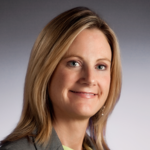27 Nov Interview with Deven McGraw of Ciitizen

Deven McGraw is the Chief Regulatory Officer for Ciitizen. Prior to joining Ciitizen, she directed U.S. health privacy and security policy through her roles as Deputy Director for Health Information Privacy at the HHS Office for Civil Rights (the office that oversees HIPAA policy and enforcement) and Chief Privacy Officer (Acting) of the Office of the National Coordinator for Health IT. Deven also advised PCORNet (the Patient Centered Outcomes Research Network), as well as the federal All of Us Research Initiative, on HIPAA and patient-donated data research initiatives. Read her full bio.
Interview with Deven McGraw of Ciitizen
Q: Patient healthcare data aggregation and analysis is seen as both the panacea for tremendous breakthroughs in precision medicine and as one of its biggest challenges. Are both true and how so?
A: Yes, both are true. Achieving breakthroughs in precision medicine will require a lot of data – and yet it is often difficult for researchers to amass all of the data needed to advance precision medicine discoveries. Getting data from institutions can be a slog, due to multiple layers of review, lack of institutional incentives to share, and proprietary concerns. But individuals – particularly patients and their families – have great incentives to share data, to save themselves and to improve prospects for others like them. But the challenge is that individuals can face enormous obstacles in getting their data. They have a legal right to this data – but the institutions who hold this data still make it difficult for individuals to get their data.
Q: What are the biggest hurdles today in getting people to share their health data?
A: The biggest hurdle today in getting people to share their health data is that people can’t share what they don’t have. The obstacles to individuals getting all of their health data – so they can then share it to power discoveries – are far larger than the obstacles to sharing once individuals have dominion and control over their data. A second hurdle (which frankly will be far easier to solve) is providing people with trusted options for donating their data. It is a misnomer that people who are sick “don’t care” about their privacy – they do care, but they also want ways to liberally share their health information in order to try to help themselves and others like them.
Q: How can they be overcome? What is needed?
A: What is needed is for entities to more consistently comply with legal mandates to provide health data to patients. This is the law in the U.S. (HIPAA), and it is also the law in the EU (GDPR) and in other jurisdictions. U.S. law could also use some improvements, for example shorter timelines for release of data (30 days is way too long) and waiving of fees, particularly for patients who are sick.
Q: We have a long way to go with clinical trials enrolling at 2-3% today and that number falling. What type and level of shift in culture, laws, collection methods, or other areas is going to be needed to accomplish widespread data sharing?
A: Giving health information to patients – and letting them share data for clinical trial enrollment purposes – is a strategy that has been significantly underutilized. There are some restrictions that institutions face in allowing researchers to both examine data for potential clinical trial participants and then reach out to those individuals to enroll them. In addition, a single institution may not have all of the relevant data on a patient, because individuals – particularly those who are ill – are cared for in multiple settings. If patients are given dominion and control over all of their health information, they can actively seek out potential trials, or allow trial sponsors to examine their data to determine if they are eligible.
Q: Will there always be certain communities or populations that will not participate in research because of history or privacy issues?
A: Without a doubt there is work to do to earn the trust of individuals in communities with a deep distrust of research. But it is critical that we do this work, because those communities are significantly affected by disparities in health care – and data sharing will be key to eliminating those disparities. Building trust starts by giving control of health data to those individuals and communities – so that they are empowered to make decisions about with whom they will share this data.
Q: What role will personal technology play in scaling health data sharing and collection?
A: The patient, who has the right to all of their health information and the most interest in sharing it, should be the hub for data collection and sharing. But patients generate a great deal of health information – personal technology is key to enabling each patient to collect, aggregate and easily share his or her information. In addition, medical breakthroughs likely require amassing of large data sets – so personal technologies that enable patients to collectively share their data for medical breakthroughs will be essential.






